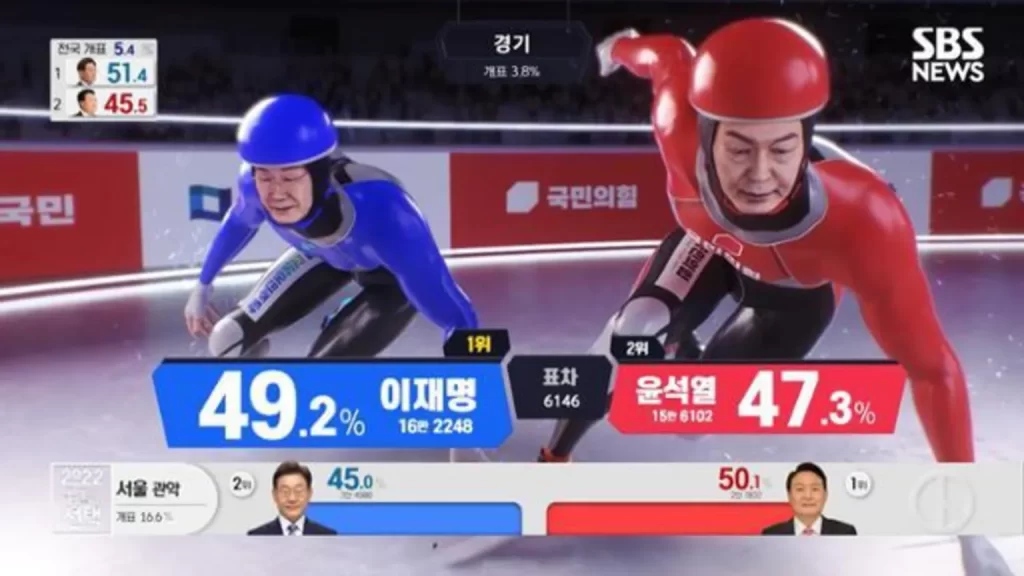Anyone switching on their television set in South Korea tonight will be able to take their pick of exciting viewing options – parliamentary candidates starring in a romantic melodrama, fighting it out on a Hollywood-famous train, or even engaging in a rap battle.
This is how the country’s leading broadcasters vie for viewership on polling night.
South Koreans will vote for a new 300-member parliament today, in an election widely seen as a midterm referendum on President Yoon Suk Yeol’s administration.
Meanwhile another fierce battle is playing out behind TV screens. As they seek to draw in young viewers for the vote count, the TV networks will each roll out visual, entertaining programmes with the help of pop culture, artificial intelligence and fancy graphics.
The Seoul Broadcasting System’s (SBS) big offering this year will be parodying scenes from Stairway to Heaven – a classic Korean tearjerker first released in 2003 – interspersed with a blockbuster segment mimicking Mission: Impossible’s famous train stunt scene.
Only, instead of Tom Cruise taking on villains on a fast-moving train, candidates will be featured in fierce fights on a fictional train heading towards the National Assembly while trying to secure as many seats as they can aboard.
This is the end result of a year-long labour of love – an offering planned by a crack team put together to maximise impact.
“We often say that it's like we're preparing for the Olympics,” explains Park Ha-jeong, a reporter from SBS's election broadcasting planning team.
“I feel like we're showcasing all the hard work and training we've put in, and I always think that the other broadcasters are also working hard and sweating during this period.”
It took a team of 70 to prepare the show in advance, with about 200 people working on election night.
SBS grabbed the highest ratings among viewers 20 to 49 in the Seoul metropolitan area during the exit polls for the 2022 presidential race – with its animated shorts featuring Mr Yoon and his rival Lee Jae-myung as athletes in the Winter Olympics.
National broadcaster KBS, which won the overall battle for viewers that night with a viewership rating of 11.1%, will feature avatars of parliamentary candidates in a rap battle in this year’s election offering, with the raps composed based on their election pledges.
Such election coverage has won over some young voters.
Lee Da-hye, an undergraduate majoring in political science and diplomacy, believes it could go as far as encouraging a younger generation to get out and vote.
“The memes and [computer graphics] associated with candidates can make the authoritarian image of politicians feel more approachable, and I expect it will also increase interest in politics,” she says.
Park Eun-hye, 25, said watching past election night broadcasts had prompted her to look up some candidates’ profiles and pledges.
“It wasn't boring at all. Also it sparked new conversations with my friends and family as we watched together,” she said.
But it is not for everyone, admits Cho Jeoung, the head of SBS’s news headquarters.
“We aimed for that to grab more attention, but some older viewers found it a bit noisy.
“Now, we're widening our scope by adding more elements that resonate with older generations. Many warm and humanistic scenes are included in our content.”
And to be fair, it is only sensible. The landscape is changing, with over-50s now making up more than half of South Korea’s electorate.
A slowing economy, an ageing population and the rising cost of living are among key issues in this year’s elections – all of which have no easy solution.
While these broadcasters’ election night coverage may attract viewers, the problem is that it plays down the importance of these big issues, says Professor Kim Chunsik of the Hankuk University of Foreign Studies.
“The graphics by Korean broadcasting stations are undoubtedly entertaining and contain many elements of amusement,” he said. “If we're just looking at the ratings, broadcasts that incorporate elements of [pop culture] could receive positive evaluations.
“However, when you look at the election coverage as a whole, there isn't much information provided to voters about the issues they should consider before voting. Whether it's issues related to childbirth, education, or healthcare, broadcasters need to show as much interest in monitoring policy environments as they do in producing election night broadcasts.”
But SBS’s Mr Cho disagrees.
“We are also cautious about focusing solely on the outcomes of winning and losing in the election results. We plan to highlight the political and societal significance of this election by adding panel discussions and other segments in the election broadcast package,” he said.
The fact is these programmes are bringing in the viewers – with or without the added value.
“About a decade ago in the early 2010s, there was a perception that election broadcasts were solemn, dull… [So] we started to put effort into diversifying the election broadcasts and creating content that would engage viewers.”
With other channels following in their footsteps, competition spurred even more compelling content, says Mr Cho.
“We attempted and succeeded in creating content that allows our consumers and viewers to see and enjoy elections, the very essence of democracy, as a festival,” he says.


